This post may contain affiliate links. For more info, please read our full disclosure here
Proper skin care is, has been, and always will be an important component of any healthy lifestyle.
Our skins, just like every other organ of the body require proper care, especially considering the different things we are exposed to on a daily basis.
From harmful UV radiation from the sun, to different chemicals we might come in contact with depending on our environment, to other lifestyle factors, and so on.
These things either individually or collectively, and depending on the situations may cause our skin not to look as good as it should be looking.
One popular method used in skin care, is the application of a certain types of “natural oils” to the skin.
These oils are said to have properties that can promote skin health, and prevent and/or solve certain skin conditions, among other things.
In this post, you’ll discover exactly what natural oils are, how they work, as well as 10 of the best natural oils to use for healthy, glowing and radiant skin.
Let’s dive in.
What Exactly Are Natural Oils?
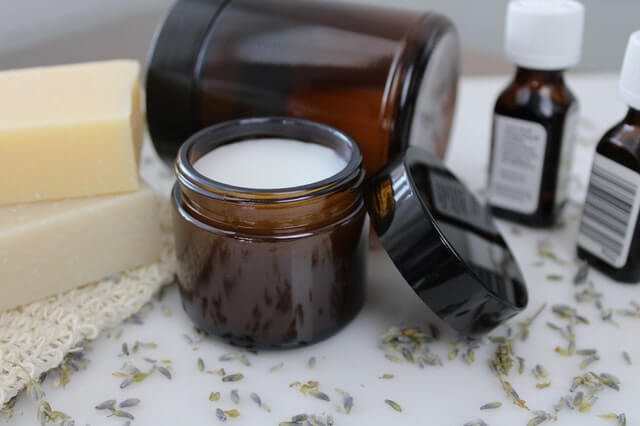
The name is pretty much self-explanatory. Natural oils can be found “naturally” in a variety of plant species. These plants may be subjected to a number of different processes in order to extract the needed oil.
Depending on the type of plant, natural oils are usually grouped as either essential or carrier oils.
Essential oils get their name from the word “essence”, which is used to denote certain qualities of a plant, such as the aroma, fragrance and scent.
They’re usually used in aromatherapy, as well as for other purposes, such as in skin care.
When it comes to skin applications, essential oils are too concentrated to be applied in their raw and basic form, and are often diluted with the help of another group (A.K.A carrier oils).
Natural oils (both essential and carrier), when used right, can offer tremendous benefits, and contribute to a healthier, and much better skin.
Now, here are 10 of the best natural oils you can use on your skin, to get that healthy and radiant glow you desire.
P.S… This list focuses mainly on carrier oils. We saved essential oils for another post.
10 Best Natural Oils For Skin Health
1) Coconut oil
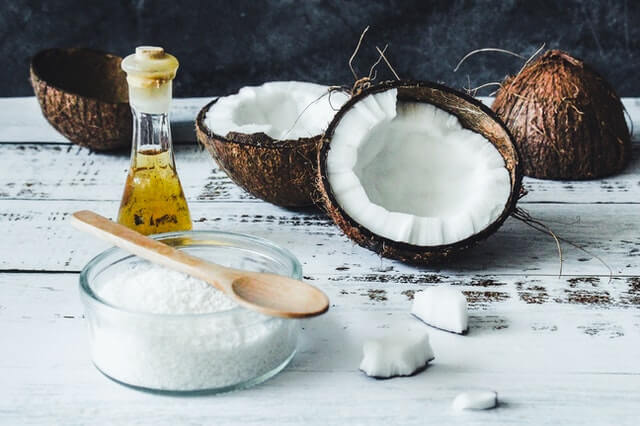
As far as oils go in general, coconut oil is without a doubt one of the best to have in your arsenal. While they’re very popular when it comes to healthy cooking, they’re also pretty useful in other areas, such as skin and hair care.
There are 2 major types of coconut oil you’d find in markets today. The refined type, and the virgin type.
Refined coconut oil goes through a bit of extra processing in order to have a higher smoke point, which makes them suitable for cooking.
Unrefined or virgin coconut oil on the other hand, represents the coconut oil extract in its purest possible form suitable for use.
When it comes to skin care, virgin CO is definitely your best bet.
Benefits
When it comes to the benefits, coconut oil sure has a lot going for it. It’s composed of a number of good fatty acids, such as Lauric acid and Myristic acid, among others.
The presence of these fatty acids gives CO certain qualities that make them excellent for a wide variety of skin types.
For example, CO has been shown to have anti-microbial properties, meaning it can help get rid of, and also protect your skin from invasion by certain harmful microorganisms.
Coconut oil is also anti-inflammatory, and can help ease and reduce inflammation, since it is rich in free radicals that help fight oxidative stress.
Then there’s also the moisturizing part. Due to its nature, CO can help lock in moisture, giving your skin a more supple and beautiful look.
There’s a bit of a debate when it comes to coconut oil use for acne. Some people believe it can help cure it thanks to some of the characteristics mentioned above. Others believe CO may worsen acne in some situations, especially for those with acne-prone skin.
There’s really no real way to be sure, apart from testing it out for yourself. All things considered, coconut oil is still one of the best natural oils for skin.
Also See: 10 Best Foods To Eat For Healthy Glowing Skin
2) Avocado Oil
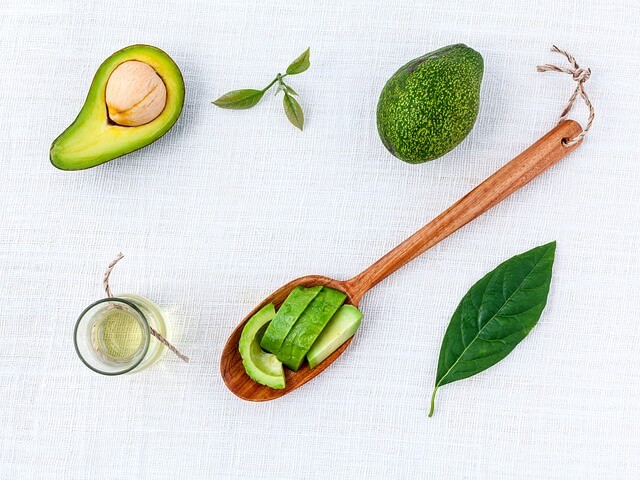
Avocados are one of the superstars of the nutritional world. They’re high in healthy fats, low in carbs, and super rich in nutrients, and not to mention being incredibly tasty too.
With all the good things the avocado fruit (yes, technically it’s a fruit) has going for it, it’s no surprise that the oil extract gotten from avocados would also come with some promising benefits as well.
Virgin avocado oil, which is the best, is gotten from the fresh of the avocados, after they have been peeled and de-seeded.
The flesh is left to dry, to remove as much moisture as possible, and then the oil is then extracted through several mechanical methods.
Benefits
Avocados are rich in a good number of nutrients and antioxidants, such as vitamin A, E, B-6, potassium, magnesium and so on. The oil extracted from them also shares the nutritional similarity.
Given their antioxidant-rich nature, avocado oil can serve as a good anti-inflammatory agent, and help reduce or fight against oxidative stress.
This means it can help protect against certain inflammatory skin diseases, such as acne, eczema and psoriasis, among others.
It’s also a good moisturizing agent, and can help protect your skin against breakouts and give you a younger, fresher glow.
As with most other skin-healthy oils, allergies are still a possibility, even though they’re quite rare. It’s important to always test things out for yourself, and consult your dermatologist if you notice certain reactions you don’t like.
3) Olive Oil
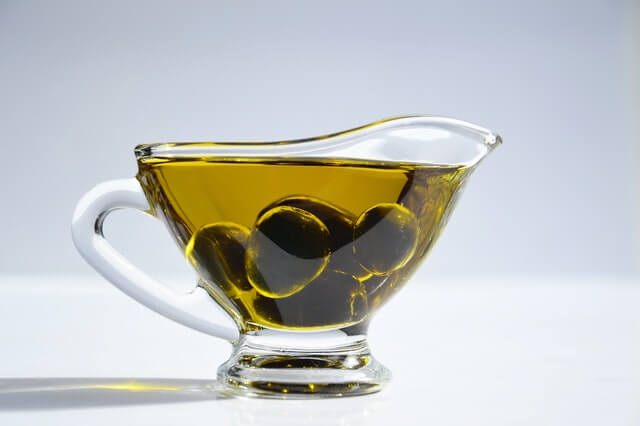
Praised as one of the healthiest alternatives to regular vegetable oils used for cooking, olive oil can easily be found in the cabinets of most people following healthier diets.
All those wonderful health claims don’t just stop at the kitchen. They also extend into basic skin and hair care as well.
You’d generally find 2 main types of Olive oil. Refined and virgin. They’re both produced the same way, by crushing the olives into a pulp and mechanically extracting the oil.
The only difference is that refined OO uses the addition of heat and some chemicals, to improve its quality. This usually happens when the raw olives used are of a lower grade.
When it comes to skin care, virgin or extra virgin olive oil is what you want to be looking for. It is obtained from the highest-grade olives, and is super rich in nutrients.
Benefits
Like the two others listed before it, olive oil is a great source of antioxidants, and can help to fight inflammation, and prevent against inflammatory skin conditions as well.
It also has anti-microbial properties, which can help protect your skin against potentially dangerous microorganisms that may cause unwanted skin conditions.
Apart from its obvious moisturizing benefits olive oil has also been shown to help reduce the effects of exposure to UV rays, post-exposure.
Another plus that comes with olive oil, is that it serves as a good make-up remover, especially if your makeup contains water-resistant substances.
As far as risks go, olive oil just like the other ones listed above seem to be safe for most people to use. However, certain people with particularly sensitive skins may experience some issues.
Like always, testing things out is everything. And you can always consult your dermatologist for clarifications if you notice things going south.
4) Grapeseed Oil

Grapes are a naturally sweet and juicy fruit. While you may enjoy munching on the flesh of the fruit from time to time, you may not have noticed how good their seeds are for you.
Grapeseed oil, which is the oil extract gotten from the seeds, are usually touted as a better and healthier alternative to regular vegetable cooking oils.
While there seems to be some debate in that aspect, the benefits when it comes to skin and hair care are pretty evident.
First, the extraction. Grapeseed oil can be gotten through a number of means, mainly chemical and mechanical.
A lot of the controversy around it comes from how it’s gotten. Chemical extraction methods use chemical like hexane, which raises some health concerns for people in terms of how safe it is for cooking.
Mechanical methods, like cold pressing tend to produce the best quality oil, both for cooking and for beauty applications.
Benefits
Unlike a lot of the previous oils listed here, grapeseed oil doesn’t boast of a large nutritional profile. But that doesn’t mean it isn’t packing good nutrients.
Grapeseed oil is known for its high vitamin E content, as well as the presence of omega-6 fatty acids.
Vitamin E is a pretty important and powerful antioxidant, meaning it can help you fight against oxidative stress, which in turn leads to inflammation and its related conditions.
Omega-6 fats get a bit of a bad rap when it comes to dieting and nutrition. However, they’re not really that bad. Rather, maintaining a good ratio of omega-3 to omega-6 fats is what constitutes a healthy diet.
Coming to skin care, both omega-3 and 6 fats, affect skin and hair growth and can be beneficial in the right amounts.
Other beauty-related benefits associated with grapeseed oil include skin moisturization, tightening, reducing the appearance of scars, and improving skin tone, among others.
5) Almond oil
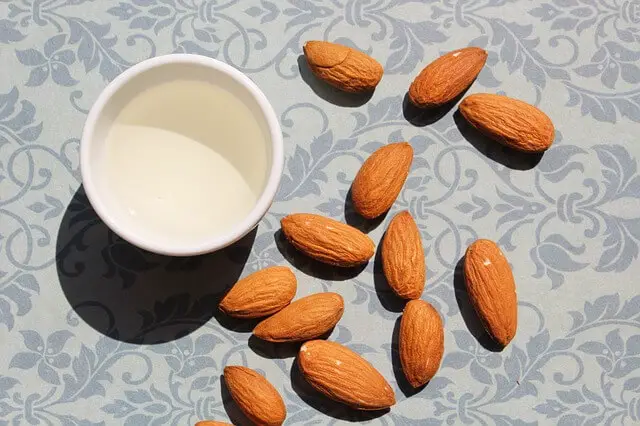
When it comes to nutritional powerhouses, there’s no denying the goodness of nuts and seeds.
Known for its tastiness, many health benefits as well as its versatility, from almond milk, to almond flour, and now almond oil, there’s no denying how good almonds are for you.
The oil from is gotten mainly through mechanical processing (cold pressing), although refined versions still exist. As with most other oils listed here, unrefined is definitely your best bet, especially when it comes to skin care.
Benefits
As said earlier, almonds are nutritional powerhouses, so it makes sense that the oil extract from them would follow suit.
They’re particularly rich in skin healthy vitamins like vitamins A and E which help protect against dangerous UV radiation, and help to fight inflammation.
In addition to that, almond oil is also good for dry skin, and can help combat the skin conditions that come along with it, like eczema for example.
It can also have positive effects on skin tone, and may help reduce the appearance of things like acne, stretch marks, and scars.
In terms of risks, almond oil is pretty safe to use in most cases. However, people with certain nut allergies might find it problematic. If you’re in doubt, you can always speak to your dermatologist for more guidance on the issue.
Nonetheless, almond oil will serve as a great addition to your skin care routine.
6) Jojoba Oil
Another prominent product when it comes to healthy oils for skin, is jojoba oil. Technically, it’s pronounced “hohoba”, but anyways, here we are (thank you English language).
It’s gotten from the seed of the jojoba plant A.K.A Simmondsia chinensis, or five-flavor berry.
Extraction of the oil from the seeds are pretty straightforward. The seeds are fist left to dry for a certain period of time, and then cold-pressed to release the “oil”.
When it comes to skin-care, jojoba has a lot of good stuff going for it.
Benefits
For starters, jojoba oil is rich in a lot of skin healthy nutrients, such as vitamin E, which helps to fight oxidative stress and inflammatory conditions.
Another reason why jojoba is good for you, is because of the nature of the oil. Unlike some other oils which may be comedogenic, meaning they may block the pores of your skin, jojoba oil is not.
On top of this, it has a nature similar to that of the sebum, which is an oily and wax-like substance our own skin produces, making it very skin-friendly.
Jojoba oil has also been used to manage conditions like acne, eczema and psoriasis, among other things. It also serves as a great moisturizing agent, and can help improve skin tone, as well as reduce the appearance of scars, and wrinkles.
As far as allergies go, they’re really, really rare if any, so you don’t have much to worry about. If you’re not adding jojoba oil to your skin care routine, then you’re missing out.
7) Argan Oil

Another amazing natural oil for healthy skin to use, is argan oil. Native to Morocco, the oil is gotten from the nuts of the argan tree fruit, and comes with a lot of attractive benefits.
Extraction of the oil is pretty standard. Like most other natural oils used for skin, cold-pressing is usually the primary method employed to obtain the oil extract.
They’re also available in the form of supplement capsules, and can be ingested as well.
Regardless of whether you choose to use them for dietary or cosmetic purposes, there’s no denying they’re pretty useful.
Benefits
Like all the other natural oils listed here, AO does not disappoint. It’s rich in antioxidants, and can help fight inflammation and its related skin conditions.
It’s also anti-comedogenic, meaning it won’t clog your pores like some other oils might. Plus, it can be used to manage conditions like acne, since it can help regulate sebum production in the skin.
Argan oil is also said to have some anti-microbial properties, making it useful against bacterial and other microbial infections. It’s also praised for its possible anti-aging abilities as well as its positive effect on skin tone.
When it comes to allergies or side effects, they’re pretty hard to find, if any. While it’s generally safe to use, caution is still advised, and you can always contact your dermatologist if you notice any adverse reactions.
All in all, it’s a wonderful natural oil to add to your skin-care routine.
8) Rosehip Oil

Who would’ve guessed that the same plants that give us these lovely and beautiful flowers could also throw in a little something extra for our skin and health? I’m talking about roses.
Rosehip oil is gotten from the rosehip fruit, which as you’ve probably guessed, is a fruit that grows on the same plants that give us the rose flower.
Some particular varieties of rose flowers, like the Rosa canina (A.K.A Dog rose), Rosa rugose (A.K.A Beach rose), and Rosa rubiginosa(A.K.A Sweet-Brier) are known for producing the best rosehips in general.
Note: Rosehip oil is very different from rose oil. The former is a natural carrier oil, while the latter is an essential oil, gotten from the rose flower itself, not the rosehip fruit. More on essential oils later.
Benefits
Rosehip oil (RHO) has a quite a lot going for it when it comes to skin care. For starters, let’s take a little peep into its nutritional profile.
RHO is super rich in vitamin C, even more than oranges. They’re also rich in a good number of other nutrients, such as vitamin A, and omega-3 and 6 fatty acids.
Vitamin C is a pretty important antioxidant, since it helps us fight against free radicals brought about by exposure to UV rays. On top of that, it can help improve the appearance of some undesirable skin “conditions” like wrinkles.
Rosehip oil has proven to be a great moisturizer, even for sensitive skins, and can help reduce issues like hyperpigmentation, and even possibly boost collagen production.
In terms of risks or side effects, RHO appears to be safe for most skins, even the sensitive types. However if you notice any weird symptoms, don’t hesitate to reach out to your dermatologist.
9) Sunflower oil
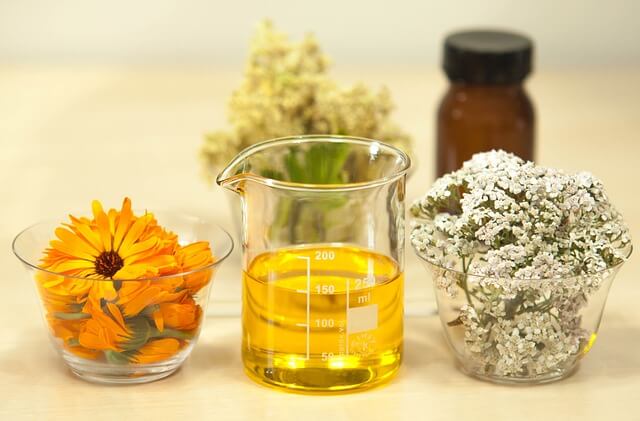
Another useful natural oil to add to your list, is sunflower oil. Although they’re popularly used as a cooking oil, they also offer a number of benefits for the skin.
It is worth noting however, that the SO you find in the kitchen is NOT the same type you want to be applying topically on your skin.
The versions used for cooking are usually highly processed, and contain chemicals you certainly don’t want to be applying directly on your skin.
The best ways to reap the benefits of sunflower oil, is by getting the natural cold-pressed versions, or using reputable skin-care products that include them in their ingredients.
Benefits
As said earlier, SO offers quite a range of interesting benefits for the skin. For starters, it’s an excellent source of vitamin E.
As pointed out earlier, vitamin E is a pretty important and powerful antioxidant, which can help fight against inflammation, and protect against the negative effects of UV ray exposure from the sun.
Sunflower oil is also a source of linoleic and oleic acid, which are types of omega-6 and Omega-9 fatty acids respectively. These fatty acids help to maintain a healthy skin barrier, as well as possibly repair damaged skin.
Another good point for sunflower oil, is the fact that it is non-comedogenic, so you don’t have to worry about it clogging your pores either.
Apart from the extremely rare case of allergies/sensitivities, sunflower oil is a great natural oil, and certainly deserves a place in your skin-care routine.
10) Black Seed Oil
Last but certainly not the least, we have black seed (A.K.A black cumin seed/black caraway seed) oil.
This wonderful natural oil, gotten from the Nigella sativa plant, has been used for centuries for a variety of different purposes. From cooking, to disease treatment, to cosmetic/skin-related purposes and more.
Benefits
Black seed oil does offer a range of interesting health benefits. From having anti-inflammatory and anti-cancer properties, to supporting heart health, lowering blood sugar levels and much more.
In terms of skin health, it certainly doesn’t lag behind.
Being a good source of anti-oxidants, it can help protect you against oxidative stress from free radicals, and also help fight inflammatory skin conditions, like eczema, psoriasis and acne.
In terms of risks, BSO seems safe for most people. As always, since our bodies are different, it’s always advised to test things out for yourself, to see which one suits you better.
While most studies on BSO seem to be more on animals than humans, the natural oil does show promising signs for skin health, and health in general, and is certainly worth adding to your routine.
